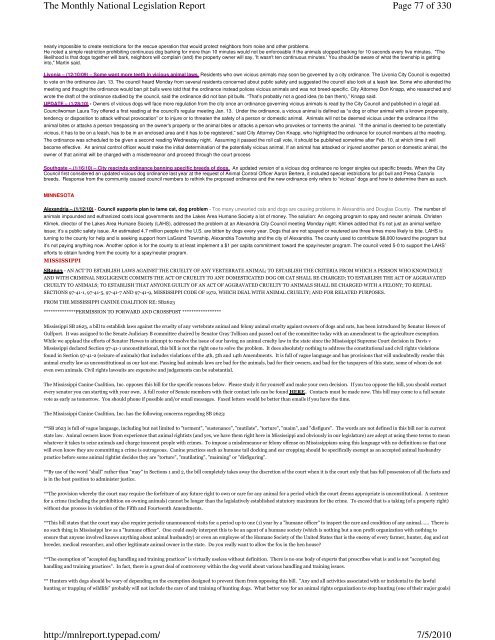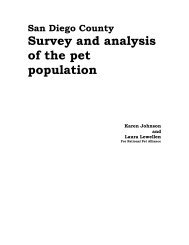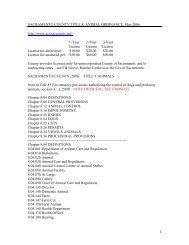Page 1 of 330 The Monthly National Legislation Report 7/5/2010 ...
Page 1 of 330 The Monthly National Legislation Report 7/5/2010 ...
Page 1 of 330 The Monthly National Legislation Report 7/5/2010 ...
Create successful ePaper yourself
Turn your PDF publications into a flip-book with our unique Google optimized e-Paper software.
<strong>The</strong> <strong>Monthly</strong> <strong>National</strong> <strong>Legislation</strong> <strong>Report</strong>http://mnlreport.typepad.com/<strong>Page</strong> 77 <strong>of</strong> <strong>330</strong>7/5/<strong>2010</strong>nearly impossible to create restrictions for the rescue operation that would protect neighbors from noise and other problems.He noted a simple restriction prohibiting continuous dog barking for more than 10 minutes would not be enforceable if the animals stopped barking for 10 seconds every five minutes. "<strong>The</strong>likelihood is that dogs together will bark, neighbors will complain (and) the property owner will say, 'It wasn't ten continuous minutes.' You should be aware <strong>of</strong> what the township is gettinginto," Martin said.Livonia – (12/10/09) – Some want more teeth in vicious animal laws. Residents who own vicious animals may soon be governed by a city ordinance. <strong>The</strong> Livonia City Council is expectedto vote on the ordinance Jan. 13. <strong>The</strong> council heard Monday from several residents concerned about public safety and suggested the council also look at a leash law. Some who attended themeeting and thought the ordinance would ban pit bulls were told that the ordinance instead polices vicious animals and was not breed-specific. City Attorney Don Knapp, who researched andwrote the draft <strong>of</strong> the ordinance studied by the council, said the ordinance did not ban pit bulls. “That’s probably not a good idea (to ban them),” Knapp said.UPDATE – (1/28/10) - Owners <strong>of</strong> vicious dogs will face more regulation from the city once an ordinance governing vicious animals is read by the City Council and published in a legal ad.Councilwoman Laura Toy <strong>of</strong>fered a first reading at the council's regular meeting Jan. 13. Under the ordinance, a vicious animal is defined as “a dog or other animal with a known propensity,tendency or disposition to attack without provocation” or to injure or to threaten the safety <strong>of</strong> a person or domestic animal. Animals will not be deemed vicious under the ordinance if theanimal bites or attacks a person trespassing on the owner's property or the animal bites or attacks a person who provokes or torments the animal. “If the animal is deemed to be potentiallyvicious, it has to be on a leash, has to be in an enclosed area and it has to be registered,” said City Attorney Don Knapp, who highlighted the ordinance for council members at the meeting.<strong>The</strong> ordinance was scheduled to be given a second reading Wednesday night. Assuming it passed the roll call vote, it should be published sometime after Feb. 10, at which time it willbecome effective. An animal control <strong>of</strong>ficer would make the initial determination <strong>of</strong> the potentially vicious animal. If an animal has attacked or injured another person or domestic animal, theowner <strong>of</strong> that animal will be charged with a misdemeanor and proceed through the court processSouthgate – (1/16/10) – City rescinds ordinance banning specific breeds <strong>of</strong> dogs. An updated version <strong>of</strong> a vicious dog ordinance no longer singles out specific breeds. When the CityCouncil first considered an updated vicious dog ordinance last year at the request <strong>of</strong> Animal Control Officer Aaron Bertera, it included special restrictions for pit bull and Presa Canariobreeds. Response from the community caused council members to rethink the proposed ordinance and the new ordinance only refers to “vicious” dogs and how to determine them as such.MINNESOTAAlexandria – (1/12/10) - Council supports plan to tame cat, dog problem - Too many unwanted cats and dogs are causing problems in Alexandria and Douglas County. <strong>The</strong> number <strong>of</strong>animals impounded and euthanized costs local governments and the Lakes Area Humane Society a lot <strong>of</strong> money. <strong>The</strong> solution: An ongoing program to spay and neuter animals. ChristenKlimek, director <strong>of</strong> the Lakes Area Humane Society (LAHS), addressed the problem at an Alexandria City Council meeting Monday night. Klimek added that it’s not just an animal welfareissue; it’s a public safety issue. An estimated 4.7 million people in the U.S. are bitten by dogs every year. Dogs that are not spayed or neutered are three times more likely to bite. LAHS isturning to the county for help and is seeking support from LaGrand Township, Alexandria Township and the city <strong>of</strong> Alexandria. <strong>The</strong> county used to contribute $8,000 toward the program butit’s not paying anything now. Another option is for the county to at least implement a $1 per capita commitment toward the spay/neuter program. <strong>The</strong> council voted 5-0 to support the LAHS’efforts to obtain funding from the county for a spay/neuter program.MISSISSIPPISB2623 - AN ACT TO ESTABLISH LAWS AGAINST THE CRUELTY OF ANY VERTEBRATE ANIMAL; TO ESTABLISH THE CRITERIA FROM WHICH A PERSON WHO KNOWINGLYAND WITH CRIMINAL NEGLIGENCE COMMITS THE ACT OF CRUELTY TO ANY DOMESTICATED DOG OR CAT SHALL BE CHARGED; TO ESTABLISH THE ACT OF AGGRAVATEDCRUELTY TO ANIMALS; TO ESTABLISH THAT ANYONE GUILTY OF AN ACT OF AGGRAVATED CRUELTY TO ANIMALS SHALL BE CHARGED WITH A FELONY; TO REPEALSECTIONS 97-41-1, 97-41-5, 97-41-7 AND 97-41-9, MISSISSIPPI CODE OF 1972, WHICH DEAL WITH ANIMAL CRUELTY; AND FOR RELATED PURPOSES.FROM THE MISSISSIPPI CANINE COALITION RE: SB2623**************PERMISSION TO FORWARD AND CROSSPOST *****************Mississippi SB 2623, a bill to establish laws against the cruelty <strong>of</strong> any vertebrate animal and felony animal cruelty against owners <strong>of</strong> dogs and cats, has been introduced by Senator Hewes <strong>of</strong>Gulfport. It was assigned to the Senate Judiciary B committee chaired by Senator Gray Tollison and passed out <strong>of</strong> the committee today with an amendment to the agriculture exemption.While we applaud the efforts <strong>of</strong> Senator Hewes to attempt to resolve the issue <strong>of</strong> our having no animal cruelty law in the state since the Mississippi Supreme Court decision in Davis vMississippi declared Section 97-41-1 unconstitutional, this bill is not the right one to solve the problem. It does absolutely nothing to address the constitutional and civil rights violationsfound in Section 97-41-2 (seizure <strong>of</strong> animals) that includes violations <strong>of</strong> the 4th, 5th and 14th Amendments. It is full <strong>of</strong> vague language and has provisions that will undoubtedly render thisanimal cruelty law as unconstitutional as our last one. Passing bad animals laws are bad for the animals, bad for their owners, and bad for the taxpayers <strong>of</strong> this state, some <strong>of</strong> whom do noteven own animals. Civil rights lawsuits are expensive and judgements can be substantial.<strong>The</strong> Mississippi Canine Coalition, Inc. opposes this bill for the specific reasons below. Please study it for yourself and make your own decision. If you too oppose the bill, you should contactevery senator you can starting with your own. A full roster <strong>of</strong> Senate members with their contact info can be found HERE.. Contacts must be made now. This bill may come to a full senatevote as early as tomorrow. You should phone if possible and/or email messages. Faxed letters would be better than emails if you have the time.<strong>The</strong> Mississippi Canine Coalition, Inc. has the following concerns regarding SB 2623:**SB 2623 is full <strong>of</strong> vague language, including but not limited to "torment", "sustenance", "mutilate", "torture", "maim", and "disfigure". <strong>The</strong> words are not defined in this bill nor in currentstate law. Animal owners know from experience that animal rightists (and yes, we have them right here in Mississippi and obviously in our legislature) are adept at using these terms to meanwhatever it takes to seize animals and charge innocent people with crimes. To impose a misdemeanor or felony <strong>of</strong>fense on Mississippians using this language with no definitions so that onewill even know they are committing a crime is outrageous. Canine practices such as humane tail docking and ear cropping should be specifically exempt as an accepted animal husbandrypractice before some animal rightist decides they are "torture", "mutilating", "maiming" or "disfiguring".**By use <strong>of</strong> the word "shall" rather than "may" in Sections 1 and 2, the bill completely takes away the discretion <strong>of</strong> the court when it is the court only that has full possession <strong>of</strong> all the facts andis in the best position to administer justice.**<strong>The</strong> provision whereby the court may require the forfeiture <strong>of</strong> any future right to own or care for any animal for a period which the court deems appropriate is unconstitutional. A sentencefor a crime (including the prohibition on owning animals) cannot be longer than the legislatively established statutory maximum for the crime. To exceed that is a taking (<strong>of</strong> a property right)without due process in violation <strong>of</strong> the Fifth and Fourteenth Amendments.**This bill states that the court may also require periodic unannounced visits for a period up to one (1) year by a "humane <strong>of</strong>ficer" to inspect the care and condition <strong>of</strong> any animal...... <strong>The</strong>re isno such thing in Mississippi law as a "humane <strong>of</strong>ficer". One could easily interpret this to be an agent <strong>of</strong> a humane society (which is nothing but a non pr<strong>of</strong>it organization with nothing toensure that anyone involved knows anything about animal husbandry) or even an employee <strong>of</strong> the Humane Society <strong>of</strong> the United States that is the enemy <strong>of</strong> every farmer, hunter, dog and catbreeder, medical researcher, and other legitimate animal owner in the state. Do you really want to allow the fox in the hen house?**<strong>The</strong> exemption <strong>of</strong> "accepted dog handling and training practices" is virtually useless without definition. <strong>The</strong>re is no one body <strong>of</strong> experts that prescribes what is and is not "accepted doghandling and training practices". In fact, there is a great deal <strong>of</strong> controversy within the dog world about various handling and training issues.** Hunters with dogs should be wary <strong>of</strong> depending on the exemption designed to prevent them from opposing this bill. "Any and all activities associated with or incidental to the lawfulhunting or trapping <strong>of</strong> wildlife" probably will not include the care <strong>of</strong> and training <strong>of</strong> hunting dogs. What better way for an animal rights organization to stop hunting (one <strong>of</strong> their major goals)




